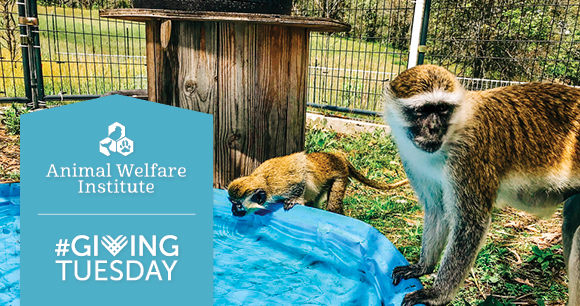
November 29 is Giving Tuesday—a global day of giving that offers the perfect opportunity during the holiday season to contribute to a better world. This year, the Animal Welfare Institute (AWI) is raising funds to help worthy rescue organizations care for and rehabilitate former laboratory animals.
We ask that you join us by donating on November 29 to help animals used in research experiments get a second chance at life. Animals released from laboratories are often in desperate need of socialization and proper enrichment, along with requiring food, shelter, and regular veterinary care. Our goal this year is to raise $30,000. To double your impact, AWI will match the first $10,000 donated to this campaign.
Earlier this year, the rescue and adoption of nearly 4,000 beagles from abusive conditions at an Envigo breeding facility in Virginia made national headlines, yet many other animals formerly used in research are also in urgent need of refuge, including rabbits, primates, and mice. It is estimated that more than 100 million mice and rats as well as about 800,000 other warm-blooded animals are used each year for experimentation, testing, and teaching in the United States.
The Animal Welfare Act (AWA) is the primary federal law that protects animals in research, yet mice, rats, and birds—who account for the vast majority of animals used in research—are excluded. AWI continues to advocate greater protection of animals in laboratories, in part through stronger enforcement of the AWA and extension of the law’s coverage to additional species subject to experimentation.
From rats to macaques, many laboratory animals live alone in relatively barren cages that offer nothing similar to the complexity of the species’ natural environment, leading to anxiety, depression, and abnormal behaviors.
In contrast, rats who are rehomed can have the opportunity to explore, play, and forage. Primates released from labs can thrive at sanctuaries—climbing on tree branches, splashing in water pools, chewing on pumpkins, and grooming their companions.
Will you join us in giving them a second chance by donating on November 29? All online donations made during the week of Giving Tuesday (November 27–December 3, 2022) will automatically be designated to give these animals the love and care that they deserve. Here are some examples of your donations at work helping animals released from research labs:
- A $20 donation will provide bedding for a rat for four months.
- A $50 donation will buy five weeks of fresh greens for a rabbit.
- A $150 donation will provide enough hay to feed a sheep for a year.
- A $500 donation will buy three new cages and necessary enrichment furnishings to house a dozen mice.
- A $1,000 donation will provide initial veterinary care and diagnostic tests for an incoming monkey.
- A $5,000 donation will buy an outdoor enclosure for new monkey arrivals to explore and play.
If you have already donated to AWI or are a regular contributor, please accept our heartfelt thanks. Without generous contributors like you, our work to protect animals would not be possible.
Rest assured, your funds are always used wisely: Furthermore, we put your contributions to effective use—AWI consistently earns top ratings from independent charity watchdog Charity Navigator. Additionally, for the third consecutive year, we were named the top animal charity by the personal finance website WalletHub.
ADDITIONAL WAYS TO HELP THIS GIVING TUESDAY:
- Launch your own Facebook fundraiser in support of the campaign and invite your family and friends to donate.
- Follow AWI on Facebook, Instagram, and Twitter and share our posts to help spread awareness about lab animal protection.
- Take action for animals by contacting legislators and administration officials about important animal welfare issues.
Please contact [email protected] with any questions.
Marjorie Fishman, Animal Welfare Institute
[email protected], (202) 446-2128
The Animal Welfare Institute (awionline.org) is a nonprofit charitable organization founded in 1951 and dedicated to reducing animal suffering caused by people. AWI engages policymakers, scientists, industry, and the public to achieve better treatment of animals everywhere—in the laboratory, on the farm, in commerce, at home, and in the wild. Follow us on Facebook, Twitter, and Instagram for updates and other important animal protection news.